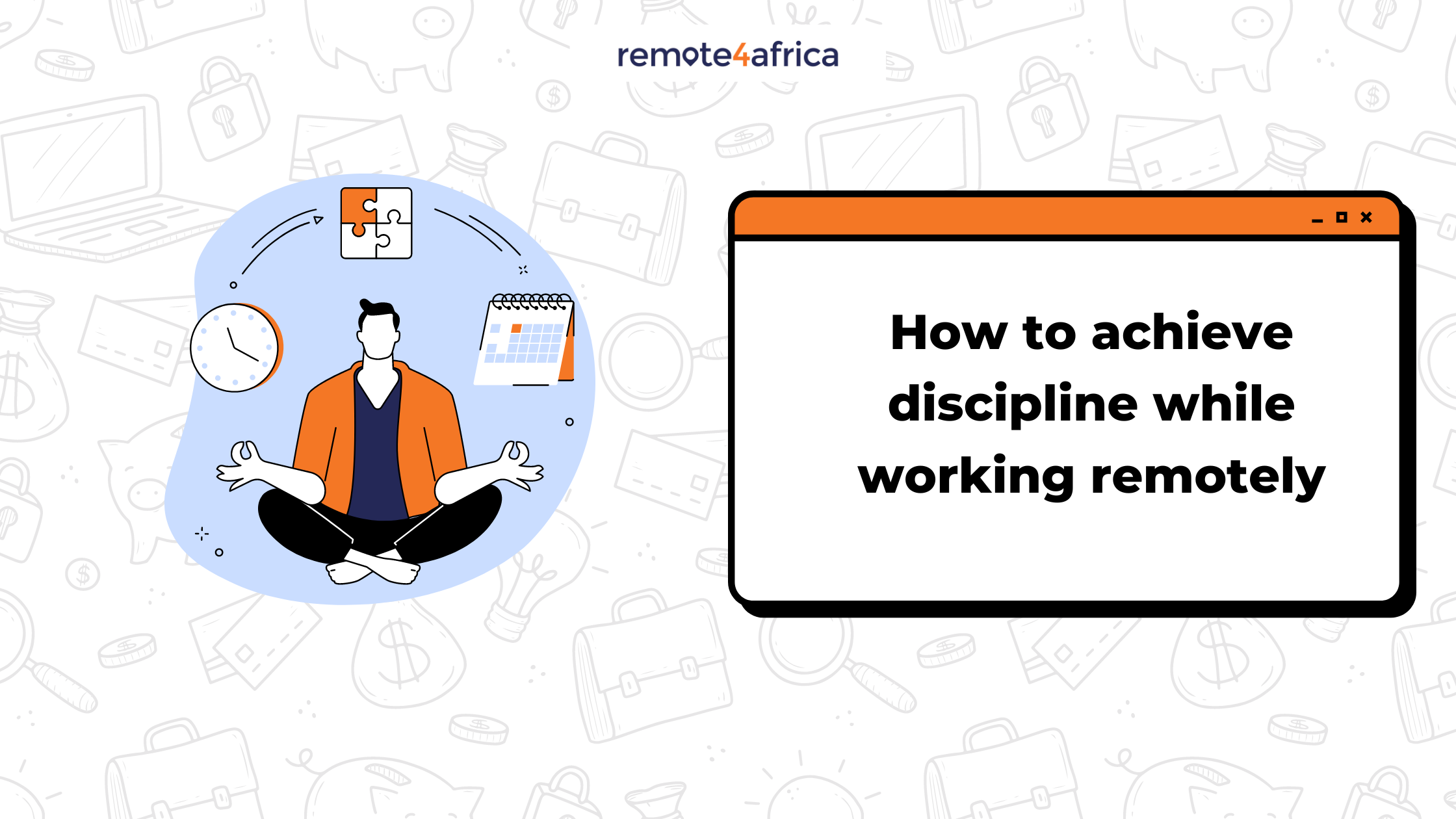How to Achieve Discipline While Working Remotely
Distractions lurk everywhere, from the never-ending Netflix queue to unlimited Instagram and tiktok reels

The remote work arrangement comes with a lot of flexibility, but freedom can be a double-edged sword. Without the watchful eye (or should we say, the gentle nudge) of a boss hovering nearby, or a physical structure that an on-site work arrangement provides, things can easily go out of control and staying disciplined can be a struggle.
Why do remote workers struggle with discipline?
The biggest culprit of this is distraction.
Distractions lurk everywhere, from the never-ending Netflix queue to unlimited Instagram and tiktok reels. As a remote worker, you are exposed to a lot of distractions that could prevent you from being productive, as you would have been in an on-site position.
The problem of discipline among remote workers often stems from the lack of external structure and accountability that come with traditional office settings. Without the physical presence of your colleagues and supervisors, it can be easier to get distracted or even procrastinate. Also, the blurred boundaries between work and personal life can make it challenging for you to maintain focus and productivity.
Why Discipline Matters (Like, A Lot)
A lack of discipline can wreak havoc on your remote work life. Suddenly, deadlines whoosh by, your inbox overflows, and that important project you were supposed to finish "first thing this morning" is still staring you down come lunchtime.
The consequences? Not pretty. Decreased productivity, missed opportunities, strained relationships with colleagues (who may be wondering why you haven't responded to their emails in, well, forever!), and even burnout.
How does a lack of discipline impact your work as a remote worker?
The effects of a lack of discipline on a remote worker can be significant and detrimental to both your performance as an individual and the overall remote work productivity of the organization. These effects include:
- Decreased productivity: Without discipline, you may struggle to stay focused and complete tasks efficiently, which leads to decreased productivity and missed deadlines.
- Quality of work: a lack of discipline can result in rushed or incomplete work, compromising the quality of deliverables and having the potential to damage your reputation.
- Missed opportunities: Procrastination and a lack of discipline may cause you to miss out on important opportunities for professional growth or advancement.
- Strained relationships: Inconsistent communication and missed deadlines can strain relationships with your colleagues, managers, and clients, which can lead to a decrease in the level of trust and collaboration.
- Increased stress: Constantly playing catch-up due to a lack of discipline can result in increased stress and anxiety, negatively impacting mental health and well-being.
- Burnout: Over time, the stress and pressure caused by a lack of discipline can lead to burnout, resulting in decreased motivation, energy, and overall job satisfaction.
- Impact on work-life balance: Without discipline, you may struggle to maintain a healthy work-life balance, leading to longer work hours, increased stress, and difficulty disconnecting from work.
It is important to note that the effects of a lack of discipline in your remote job can be far-reaching and may gradually lead to other complications that could cost you your job.
10 strategies to achieve discipline while working remotely
Achieving discipline while working remotely can be challenging, but you can definitely achieve it using the right strategies:
- Set a routine: Establish a consistent work schedule to create structure in your day. Plus, a consistent work schedule creates structure and keeps you on track.
- Designate a workspace: Have a dedicated area for workspace. This helps your brain switch into "work mode" and minimizes distractions.
- Set goals and deadlines: Break down tasks into manageable chunks and set deadlines to stay on track.
- Minimize distractions: Identify your biggest time-sucks (social media, anyone?) and find ways to neutralize them. Turn off notifications, use website blockers, or try the "pomodoro technique" (work in focused 25-minute bursts with short breaks in between).
- Take regular breaks: Schedule short breaks to recharge and maintain productivity throughout the day. Working straight through can lead to burnout. Schedule regular breaks to recharge and avoid that afternoon slump. A quick walk or some mindful meditation can do wonders for your focus.
- Stay organized: Use to-do lists, calendars, or productivity apps– these are your weapons against the chaos. Use them to keep track of tasks, deadlines, and priorities. A clear plan equals a clear mind.
- Communication is King (or Queen): Just because you're remote doesn't mean you're on a solo mission. Regular communication with colleagues and managers keeps everyone accountable and ensures you're all on the same page.
- Practice self-discipline: This might be the toughest one, but it's crucial. Resist the urge to procrastinate or get sidetracked by non-work tasks. Remember, you're in charge of your own schedule, so use it wisely
- Healthy Habits Fuel Focus: A healthy body equals a healthy mind (and a sharper focus). Regular exercise, proper nutrition, and enough sleep are essential for peak performance. Treat your body like the well-oiled machine it is.
- Reflect and adjust: Regularly assess your progress and adjust your strategies as needed. What's working? What's not? Be flexible and adapt your approach to find what works best for you.
Discipline is a Muscle, So Train It. Think of discipline like a muscle. The more you use it, the stronger it gets. Stick with it, celebrate your wins, and remember, conquering the remote work wild west is totally within your grasp!The height you attain in your career as a remote worker is largely based on the discipline you put into your work. It is a deciding factor that will make you an asset to your organization aside from your skills and qualifications; therefore, build the skill and use it.
